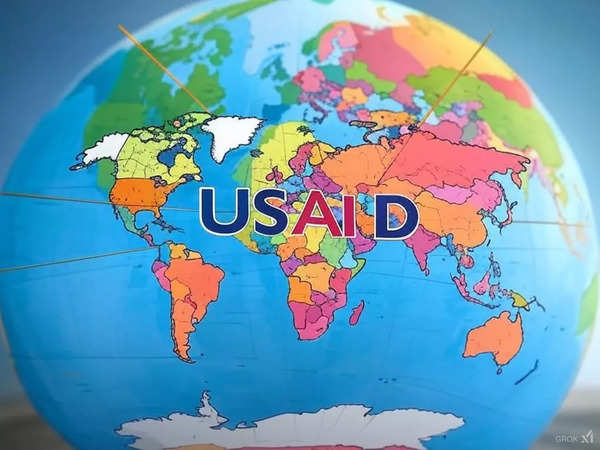What is the full form of USAID?
The United States Agency for International Development is known as USAID. It is a separate US government agency tasked with administering international aid for development and human needs worldwide.
Why is USAID in the media?
Former US State Department established Mike Benz just shared a video that went viral, explaining the reality of USAID to podcaster Joe Rogan. Benz claimed that there is no real assistance in USAID, stating it is not an support company. He claims that USAID stands for the United States Agency for International Development, but what it actually develops are activist organizations that the State Department establishes to gain control in other nations. He argued that USAID was established as the main hub for the organization of various secret international functions. Benz highlighted that USAID has a budget of$ 50 billion, noting that the entire intelligence community’s budget is only$ 72 billion. He suggested that USAID’s resources exceeds that of both the CIA and the State Department, describing the organization as a proper person supporting the Pentagon, the State Department, and the knowledge society.
Benz is renowned for his vital opinions on the government’s role in foreign influence operations and website content moderation. He frequently discusses how governments perhaps support environmentalist groups and impact operations overseas, particularly in light of how technology, free speech, and government policy intersect. His remark often addresses what he thinks domestic and international organizations overreach when it comes to regulating details and civil freedoms.
What is USAID?
The United States Agency for International Development ( USAID), which is in charge of administering humanitarian aid and development aid, has long been viewed as the country’s representative abroad. Established in 1961 by President John F. Kennedy, USAID’s goal has been to promote international development, humanitarian relief, and political leadership. The organization has been operating in over 100 countries for decades, covering topics ranging from economical growth and disaster response to political reforms. However, recent developments under the Trump presidency have cast a shadow over USAID’s potential, raising basic questions about its position, intent, and success.
On 20 January 2025, President Donald Trump signed Executive Order 14169, titled
” Reevaluating and realigning US foreign help”
To perform a thorough analysis of their effectiveness and positioning with national interests, this order placed a 90-day freeze on all US international development assistance programs. A wide range of international support programs have been affected by this abrupt halt, which has resulted in layoffs and redundancies among help workers, both domestically and internationally. Important projects in care, food security, and knowledge have been disrupted, leaving vulnerable communities in perilous situations.
When two senior USAID security officials, John Voorhees and his deputy Brian McGill, were placed on administrative leave after refusing to grant the Department of Government Efficiency ( DOGE ) access to secret documents, the situation escalated further. Despite its groups lacking the necessary safety clearances, Expand, led by software entrepreneur Elon Musk, was given sweeping powers to evaluate and audit federal agencies. Concerns were raised by the eventual access DOGE operatives regarding how to handle sensitive national security information.
USAID vs DOGE

Elon Musk, an outspoken critic of USAID, has publicly labelled the agency a” criminal organisation” and expressed his desire to see it dismantled. His DOGE initiative, created in collaboration with the Trump administration, aims to streamline government operations through aggressive budget cuts, deregulation, and the downsizing of federal workforces. Similar operations have been carried out against other federal institutions, including the Treasury Department, where DOGE teams gained access to sensitive Social Security and Medicare payment systems, leading to the resignation of a senior Treasury official.
USAID’s official website went offline without explanation, sparking further speculation about the agency’s fate. Reports from within the agency suggest that DOGE operatives, identified by visitor badges, have been questioning employees about internal operations. The Trump administration claims that USAID is ineffective and conflicts with American interests, which is how it justified these actions. President Trump has criticised the agency, stating,” It’s been run by a bunch of radical lunatics. And we’re getting them out”. The freeze on foreign aid, which has resulted in thousands of redundancies in aid organizations around the world, has been supported by Marco Rubio, the secretary of state.
The dismantling of USAID has drawn harsh criticism from lawmakers. Senator Elizabeth Warren has criticized the administration’s actions, accusing Trump of allowing unrestricted access to sensitive information and undermining crucial government functions. Warren remarked,” We must do everything in our power to push back and keep people safe.”
As the situation unfolds, the future of USAID hangs in the balance. The potential long-term consequences for US foreign policy, global humanitarian efforts, and national security are profound. The agency’s current predicament raises critical questions about the balance between governmental efficiency, the safeguarding of democratic institutions, and America’s commitment to international aid and development. The world is watching to see whether USAID will continue to serve as a beacon of hope or succumb to shifting national interests in a time when political agendas frequently predominate over humanitarian priorities.




